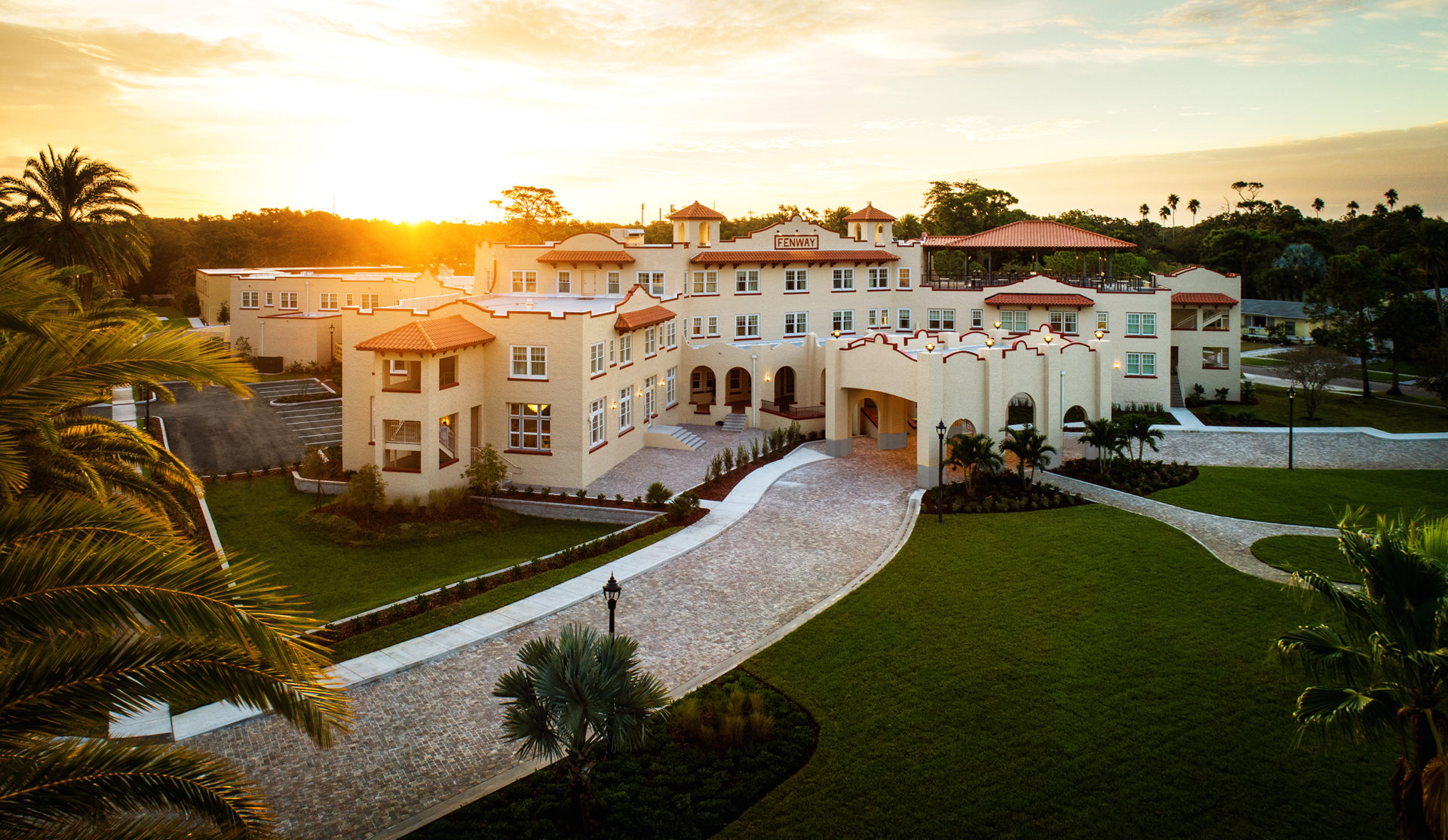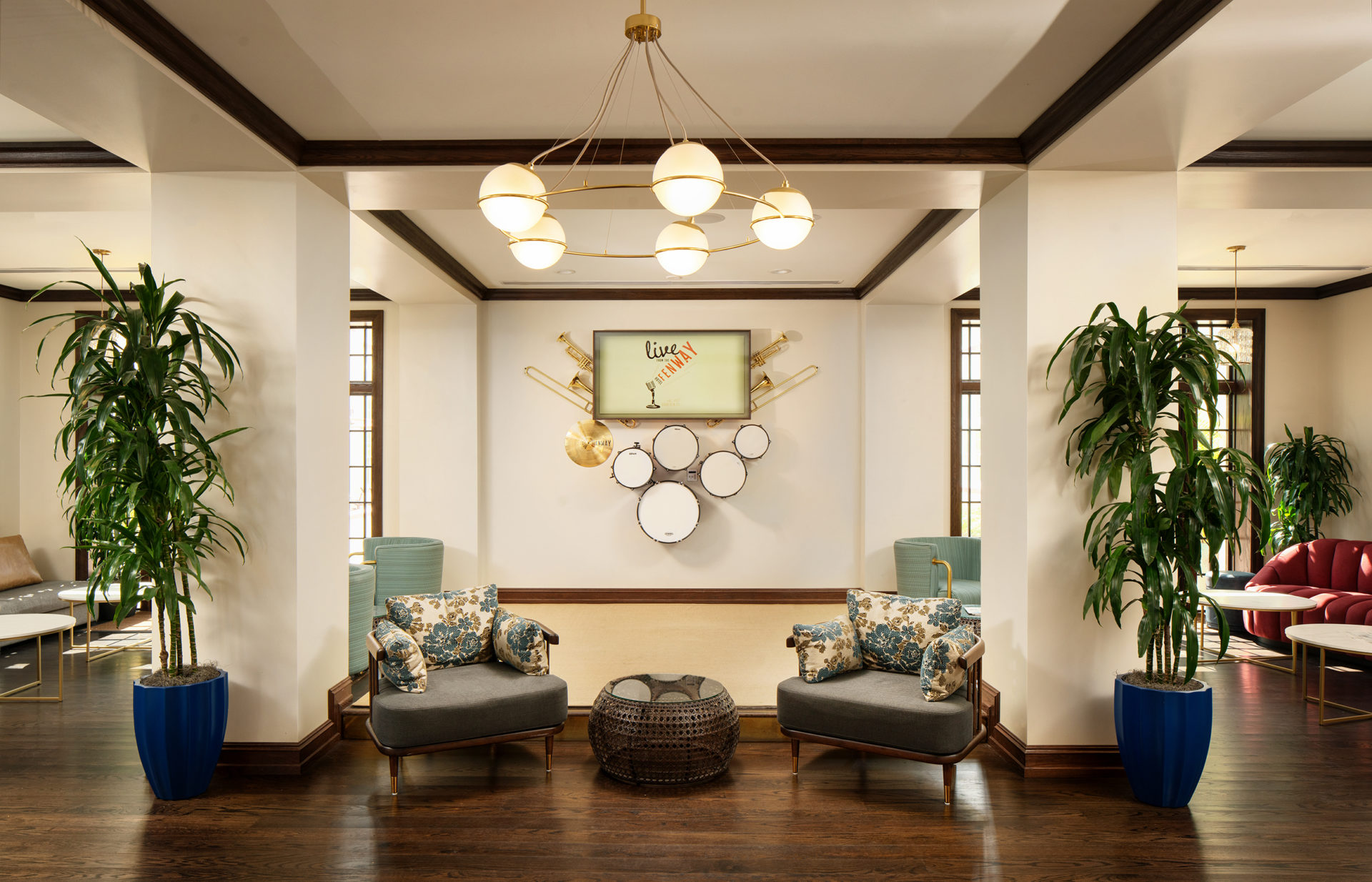The owners of the restored Fenway Hotel in Dunedin, which reopened in November 2018, tapped into its musical past and rich history and looks to the sounds of the region for its continued success.
A Jazz Age-era icon in Dunedin, the Fenway Hotel has deep roots in music and the arts. Even before it opened in 1927, the hotel was home to Pinellas County’s first radio station. During construction, the owner, G.H. Bowles, launched WGHB, the precursor to WFLA, in 1925. The station continued to air from the hotel even after the Fenway was completed. WGHB featured a variety of programming, including conversations with community leaders and organizers, performances by area musicians, and church services.
After the Fenway opened, the sound of music often filled the hotel and played a large role in its success. Visiting musicians and comedians regularly took the stage, and its house band was popular with both locals and hotel guests. Additionally, many notable individuals—politicians, intellectuals, writers, artists, scientists and explorers—hosted lectures and presentations in the Fenway’s living room.
The property hadn’t been used as a hotel in decades— in the meantime, it served as the home to several educational institutions for a number of years— and also sat vacant for about a decade. The Taoist Tai Chi Society of the USA, a non-profit organization, purchased the Fenway in 2014 for $2.8 million, intending to turn the abandoned historic structure into its national headquarters. When the Taoist Tai Chi Society ran into issues while restoring the hotel, they partnered with Mainsail Lodging & Development to complete the restoration, says Nancy Calabrese, Mainsail’s director of sales. From the beginning, it was Mainsail’s goal to tap into the Fenway’s rich history and ties to the Jazz Age. “We wanted to preserve as much as we could and really bring the history back to life,” Calabrese says. “We also committed from the beginning to do daily live music and work in other things around that.”
Today, the Fenway operates as a boutique hotel in Marriott International’s Autograph Collection, a collection of more than 180 properties around the world that “explores what makes buildings special,” she explains. It reopened in November 2018. The Fenway hired “local music stylist” Fran Bartlett to book musicians from throughout the region, she adds. They perform on a stage in the lobby most nights of the week. Bartlett is always looking to connect with musicians for this series. Those interested in being booked at the Fenway should contact the sales office at 727-683-5980 or sales@fenwayhotel.com. Musicians from outside the Tampa Bay area have also performed at the hotel. During last year’s Clearwater Jazz Holiday, one of the performers played a private show at the Fenway, and the hotel also hosts a Jazz Summer Concert Series that featured Nathan Mitchell, Marcus Anderson and Blake Aaron in 2019.
 The Fenway highlights its musical past in other ways, Calabrese says. The brass fixtures used throughout the hotel are a subtle nod to Jazz Age instruments and each room has an Alexa device ready to play a pre-selected playlist of jazz classics. The hotel has also collaborated with two nonprofit organizations – The Dunedin History Museum and the Dunedin Fine Art Center. The early partnership with the Dunedin History Museum made sense, Calabrese explains. “We wanted to make sure everything we were doing was really true to life to the history of the building.” The Fenway has also served as an alternate venue for DHM events, including a 1920s-themed cocktail fundraiser and its Speakeasy Sundays series. Many of the historic Fenway photos that are displayed throughout the hotel were donated by the museum.Before it even opened, the Fenway worked with the Dunedin Fine Arts Center, hosting its annual garden party for two years while construction was still underway. Today, the Fenway chef continues to cook at the event hosted by the Dunedin Fine Art Center. Paintings and drawings of the Fenway that were made by artists from the center are also available to purchase in the hotel lobby.
The Fenway highlights its musical past in other ways, Calabrese says. The brass fixtures used throughout the hotel are a subtle nod to Jazz Age instruments and each room has an Alexa device ready to play a pre-selected playlist of jazz classics. The hotel has also collaborated with two nonprofit organizations – The Dunedin History Museum and the Dunedin Fine Art Center. The early partnership with the Dunedin History Museum made sense, Calabrese explains. “We wanted to make sure everything we were doing was really true to life to the history of the building.” The Fenway has also served as an alternate venue for DHM events, including a 1920s-themed cocktail fundraiser and its Speakeasy Sundays series. Many of the historic Fenway photos that are displayed throughout the hotel were donated by the museum.Before it even opened, the Fenway worked with the Dunedin Fine Arts Center, hosting its annual garden party for two years while construction was still underway. Today, the Fenway chef continues to cook at the event hosted by the Dunedin Fine Art Center. Paintings and drawings of the Fenway that were made by artists from the center are also available to purchase in the hotel lobby.
“It’s been super important to us from the beginning to make sure the community was connected to the hotel,” Calabrese says. “Nodding to the building’s history versus trying to make our own story seemed the logical way to go and people are really responding to that…People want to know the story. They want to know more about the history.” The Fenway’s intentional connection to Dunedin’s history and its relationship with regional musicians and artists has played an important role in the hotel’s success, she adds. Pinellas County hotels can take note of the programs and community relationships forged at the Fenway—as inspiration for how the industry can tap into local history and connect with arts organizations and artists to grow and enhance their business.


